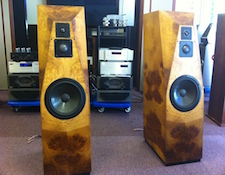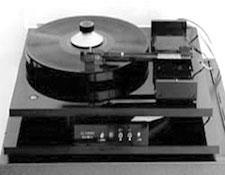It’s the time of year for saving money!
There’s an old saying “De gustibus non est disputandum” which can be translated from the Latin into English to mean “In matters of taste, there can be no disputes” or “about tastes, it should not be disputed/discussed” and, according to Wikipedia, it implies “… that everyone’s personal preferences are merely subjective opinions that cannot be right or wrong, so they should never be argued about as if they were.”
 Is that really true? It seems to me that some audiophiles (my friends and I have always simply referred to ourselves as “HiFi Crazies) , spend even more time arguing about (disputing) or preparing (gathering “specs” and literature and reading reviews) to argue about matters of taste than we do listening to music or selecting and setting-up the Systems we use to play it on.
Is that really true? It seems to me that some audiophiles (my friends and I have always simply referred to ourselves as “HiFi Crazies) , spend even more time arguing about (disputing) or preparing (gathering “specs” and literature and reading reviews) to argue about matters of taste than we do listening to music or selecting and setting-up the Systems we use to play it on.
Many years ago, when I was a Hi-Fi manufacturer (XLO cables), I went to New York to visit Michael Gindi who was, at the time, reviewing for the absolute sound. Gindi had been invited to attend a meeting of an all-Chinese Hi-Fi club in Queens, New York, and asked if I would like to join him, which I did. Before the meeting (the “official” part of which was held at a truly wonderful local Chinese restaurant) we stopped at the home of the club President to see and hear his System. This consisted of Avalon Ascent speakers driven off a Jadis Defy7 amplifier, fed from a Goldmund Reference turntable with Koetsu cartridge through a CAT (Convergent Audio Technologies) preamp, and sounded quite good. Then, on the way to the restaurant, we stopped, first at the home of the club’s Vice President and then at the home of another one of the club’s members to see and briefly listen to their Systems – both of which, as we discovered, were identical in every respect to the System we had seen and heard at the President’s house. In fact, as Gindi and I found out over a marvelous multi-course dinner at the restaurant, all 23 members of the club had exactly the same system. (!)
 How can that be, you ask? How could any TWO Hi-Fi Crazies, let alone TWENTY-THREE of them, ever have exactly the same rig? Don’t different people have different rooms and different preferences? Don’t different people LIKE different things? Don’t they have different budgets and listen to different kinds of music? Well, we asked that question of the entire club as we sat there at dinner, and what we were told was that there can only be on one best cartridge; one best turntable; one best preamp; one best amplifier; and so on; and that that’s what each of the club members had wanted and had been able to afford to buy. For that reason, they told us, the club had, based on reading and comparing all of the reviews of all of the various products in all of the magazines, selected the most highly regarded products of each kind; had sent club members out to listen and confirm the reviewers’ findings with their own ears; had, after discussion among the members, picked the one very best item in each product category; and, then satisfied that they were buying the very best available, all of the club members had bought all of those “best” products.
How can that be, you ask? How could any TWO Hi-Fi Crazies, let alone TWENTY-THREE of them, ever have exactly the same rig? Don’t different people have different rooms and different preferences? Don’t different people LIKE different things? Don’t they have different budgets and listen to different kinds of music? Well, we asked that question of the entire club as we sat there at dinner, and what we were told was that there can only be on one best cartridge; one best turntable; one best preamp; one best amplifier; and so on; and that that’s what each of the club members had wanted and had been able to afford to buy. For that reason, they told us, the club had, based on reading and comparing all of the reviews of all of the various products in all of the magazines, selected the most highly regarded products of each kind; had sent club members out to listen and confirm the reviewers’ findings with their own ears; had, after discussion among the members, picked the one very best item in each product category; and, then satisfied that they were buying the very best available, all of the club members had bought all of those “best” products.
That’s a perfectly reasonable way of doing things IF there really IS one identifiably best product of each kind, but is that even possible? Do we even know what “best” means? Should we consider the best product to be the one that provides the most value for the money? All saying that does is to put off the possibility of answering the question, because to do so you’d first have to define “value”, and that, like defining “best” is hard to do. Could it possibly be that best is “highest quality” Again, what does that mean? Goldmund, at one time, offered plug-in amplifiers (“cubes”) with gold-plated chassis for use with its speakers. I also seem to recall a very exotic and very expensive Japanese amplifier in which everything possible was made out of silver. Are those indications of quality? Or are they simply decorative and costly? Even if, as claimed, the use of precious metals adds to the products’ performance, given all of the other things that can affect performance, is the addition significant enough to make them the “best”?
How about reliability? Or being durable and long-lasting? Is THAT what it takes to make a product “the best”? I remember, hearing, back when I was much younger and Ampex (NOT Studer) was the “sine qua non” studio tape recorder, that Tandberg’s home tape recorders were actually better-sounding than the Ampex 354, but that for professional use, with as many as a hundred (for a symphony orchestra) performers ticking away at union scale or better, or with certain events or performances being impossible to “re-do”, few recording engineers, if any, were willing to risk a “take” on the Tandberg, and the Ampex, which was huge, heavy, and had a reputation for absolute and utter reliability was the unquestioned professional choice.
 In that case, “better-sounding” didn’t mean “best”, but let’s suppose that for our own purposes, “better-sounding” is the ONLY criterion, and that we’re going to ban from consideration everything else – looks, price, brand, tube or solid-state, analog or digital, reliability, build quality, reputation, and anything else that any of us might think of later, and concentrate only on how good a product sounds in making our buying decision. Does that solve the problem? No, because what I think is good-sounding may very well be different from what you think is good-sounding.
In that case, “better-sounding” didn’t mean “best”, but let’s suppose that for our own purposes, “better-sounding” is the ONLY criterion, and that we’re going to ban from consideration everything else – looks, price, brand, tube or solid-state, analog or digital, reliability, build quality, reputation, and anything else that any of us might think of later, and concentrate only on how good a product sounds in making our buying decision. Does that solve the problem? No, because what I think is good-sounding may very well be different from what you think is good-sounding.
Just as an example, I know that music played in a “hard” room will sound like that room and that a recording of it may very well be “hard” sounding and, if it’s hard enough, may even be unpleasant to listen to. To me, if that’s what the actual performance sounded like and that’s what the recording of it picked-up, that’s what I want to hear when I play it on my system. Others, though, may find it hard to accept an accurate presentation of the sound of a bad-sounding recording as good sound, and may prefer to listen to something that they LIKE over something that is more true to what’s actually in the groove or on the disc.
If you’ve been around Hi-Fi for any time at all, and if you’ve read any of the reviews of equipment in the magazines or on-line, you know what I’m talking about: You’ve seen the terms “accurate” and “musical”, and know that these have very specific meanings that may or may not bear any resemblance to how those same terms are used by other people: “Accurate”, as used by reviewers, often has little to do with how closely the sound conforms to reality, but is often simply used as a polite way to say “thin” or “cold”. “Musical”, as reviewers (and thus much of the audiophile community) use it, similarly has nothing at all to do with music, but is just the opposite of “accurate” – “sweet”, “rich”, or maybe even “lush”.
So what’s really better? Beats me; I just know what’s better for me and my purposes. As for you, “De gustibus non est disputandum”. It’s all good.





